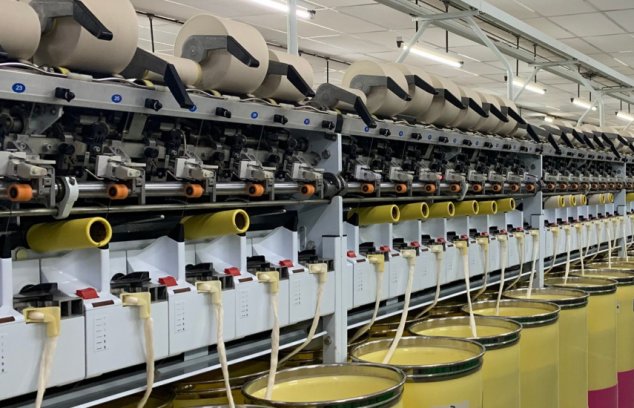
Record year for RadiciGroup
Validating the impact of investment in Tier 2 and 3 textile factories.

8th August 2025
Innovation in Textiles
|
Coimbatore, India
In 2023, the Amsterdam-based Good Fashion Fund (GFF) provided a $2.5 million long-term loan to Coimbatore, India-based Sri Kannapiran Mills (SKML).
The loan has subsequently been used to support the replacement and modernisation of key equipment at the company’s KG Naidu and Balaji cotton spinning mills and the KG Fabriks denim weaving unit.
This year, GFF, testing specialist Bureau Veritas and advisors have carried out a detailed study of the financial savings, resource efficiency gains and social improvements that have been achieved as a result of the loan.
With the funding, SKML installed newer model rotor spinning machines, auto doffers, auto blenders and high-speed winding machines. For the weaving unit, the company upgraded its singeing machine, purchased several second-hand air jet looms and a cone winding machine. In the period since the investment, the company has also improved its energy mix
Flexible capital
“Without the Good Fashion Fund, we may not have moved forward with these upgrades so confidently,” said Srihari Balakrishnan, managing director of Sri Kannapiran Mills. “As an SME navigating a turbulent global supply chain – marked by trade disruptions, rising input costs and sustained margin pressures – long-term investments are difficult to justify without the right support. The flexible capital and technical guidance from GFF helped us take a leap we couldn’t have taken alone. We’re now seeing the benefits, not just in cost savings and operational improvements, but also in product quality, data systems and progress on worker well-being. It has shown us what’s possible.”
“We verified the GFF investment’s impact at the three SKML units, confirming 886,469 kWh of annual energy savings and up to 95% in yarn waste reduction in 2024,” added Rakesh Vazirani, head of decarbonization at Bureau Veritas. “Our two-part assessment found SKML’s culture of structured data and cross-functional collaboration the key to success. Upgrades like auto-doffers, Saurer rotor machines and Reshmi winders boosted energy and material efficiency while enabling stronger operational monitoring.”
As one of the first publicly documented examples of impact validation in Tier 2 and Tier 3 textile manufacturing, the case study offers valuable insights for investors, brands and ecosystem stakeholders looking to accelerate supply chain transition.
These results reflect the effectiveness of impact investment in driving transformation within the deeper tiers of the textile supply chain beyond Tier 1 – particularly for small and medium-sized enterprises (SMEs) that are the most resource intensive and yet, undercapitalised, underserved by technical assistance and not yet reached by brand-led initiatives.
The SKML case demonstrates how targeted financing and manufacturer leadership can work together to deliver credible, measurable progress at a time when brands are under growing pressure to decarbonise and derisk their supply chains without excluding the well-being of the millions of workers embedded in them. It’s a practical example of how real alignment between sustainability commitments and factory-level action can be achieved.
“Sri Kannapiran Mills exemplifies the kind of front-running manufacturer the Good Fashion Fund is proud to support,” said Bob Assenberg, GFF fund director. “Its focus on continuous improvement, not just through upgraded equipment, but through data-driven decision making and in-house innovation, shows that transformation doesn’t always require acquiring the newest or most advanced technology.It requires a mindset. By prioritising what’s available, affordable,and adaptable to its context, SKML has delivered measurable improvements and built a foundation for long-term progress. This case strengthens our conviction that catalytic finance must go deeper into the supply chain and it directly informs the design of Good Fashion Fund 2.0, which will aim to create stronger alignment between the sustainability strategies of brands and manufacturers.”
The complete case study is available for download here.

Business intelligence for the fibre, textiles and apparel industries: technologies, innovations, markets, investments, trade policy, sourcing, strategy...
Find out more